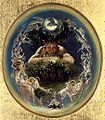Faunus
Faunus (German: Faun ) is the old Italian god of nature and the forest, the protector of farmers and shepherds, their cattle and their fields. He comes in many forms and under many names. His festival, the Lupercalia , took place on February 15th. In Greek mythology, the shepherd god Pan corresponds to him .
The female counterpart to Faunus is Fauna , who was viewed as Faunus' wife, sister, or daughter. She was also partially identified with the goddess Bona Dea .
Faunus was later perceived as a horned forest spirit or as a hybrid of humans and billy goats. Such nature spirits could also appear in plural: Latin Fauni , German Faune . Corresponding figures in Greek mythology are the satyrs .
Myth and Cult
Faunus
In Roman mythology , Faunus is the son of Picus (who was often seen as a follower of Mars or equated with it) and the grandson of Saturnus . According to Virgil , he is the father of Latinus , King of Latium.
Like its Greek counterpart, the god Pan , Faunus ensures the fertility of humans and animals, frightens people in the house and forest, also through bad dreams ( incubus ), and often does not appear as a single being, but as a large number of faunas . As Fatuus he even gives prophecies.
The Lupercalia were the feast days of the Faunus, who was nicknamed Lupercus ("wolf repeller") and is also referred to in this context as the "wolf god". The god's priests, the Luperci , sacrificed goats and cut thongs from the fresh hides. Then they circled the Palatine Hill and hit the people on their way with the straps. On the one hand, this was considered a ritual of atonement and purification (hence the name of February: Latin for february means to clean ), and on the other hand, childless women hoped for fertility from touching the belt . Similar rituals are also known from other cultures, e.g. B. under the term Schmackostern .
Fauns
Later Faunus was represented as a mythical creature from Greek mythology similar to the satyr ("Faun" can therefore also be used synonymously with "satyr"); a horned forest spirit playing a shawm or flute , a hybrid being , half human, half goat, mostly depicted with a human upper body and goat feet and tail. Fauns are supposed to watch over grain fields and encourage their growth.
reception
Visual arts
The subject of the lascivious forest god was taken up very often in the fine arts, whereby from the beginning there was no difference between the depiction of the pan, the satyr or the faun. The most famous of all fauns is the Barberian Faun , a Hellenistic sculpture from the 3rd century BC. The objection that it is evidenced by missing goat feet and a ponytail is not a faun, but a satyr, is not covered by the iconography.
Examples of the representation of the Faun in modern painting:
Faun and Girls ( Peter Paul Rubens , ca.1620–1625)
Sleeping Venus , surprised by the faunas ( Nicolas Poussin , 1626)
Faun and fairies ( Daniel Maclise , ca.1834 )
Pan, whistling to a blackbird ( Arnold Böcklin , 1863)
Faun and youth ( Hans Thoma , 1887)
Faun and Nymph ( Franz von Stuck , ca.1904)
Literature and film
As a demigod or a metaphor, the faun has often been the subject of literature. The best known is L'Après-midi d'un faune (“Afternoon of a Faun”), a symbolist poem by the French poet Stéphane Mallarmé , written between 1865 and 1867.
In Arno Schmidt's short novel From the Life of a Faun , the faun is a metaphor for a life outside: The hero, Düring, as an official under the Nazi regime, seeks refuge in a forest hut and longs for a faunal existence. In the Chronicles of Narnia by CS Lewis , a faun named Mr. Tumnus plays an important role.
Finally, a faun appears as the eponymous figure in the film Pan's Labyrinth by the Spanish director Guillermo del Toro from 2006 (original title: El Laberinto del Fauno ).
music
Mallarmé's poem was the basis for the setting Prélude à l'après-midi d'un faune ("Prelude to the afternoon of a Faun") by Claude Debussy (1894), which in turn was the music for the ballet L'Après-midi d'un Faune by Vaslav Nijinsky (1912).
literature
- Fritz Graf : Faunus. In: The New Pauly (DNP). Volume 4, Metzler, Stuttgart 1998, ISBN 3-476-01474-6 , Sp. 440-442.
- Walter Friedrich Otto: Faunus. In: Paulys Realencyclopadie der classischen Antiquity Science (RE). Volume VI, 2, Stuttgart 1909, Sp. 2054-2073.
- Pierre Pouthier, Pierre Rouillard: Faunus . In: Lexicon Iconographicum Mythologiae Classicae (LIMC). Volume VIII, Zurich / Munich 1997, pp. 582-582.
- Georg Wissowa : Religion and cult of the Romans. 2nd edition 1912, p. 213
- Georg Wissowa: Faunus . In: Wilhelm Heinrich Roscher (Hrsg.): Detailed lexicon of Greek and Roman mythology . Volume 1, 2, Leipzig 1890, Col. 1454-1460 ( digitized version ).








